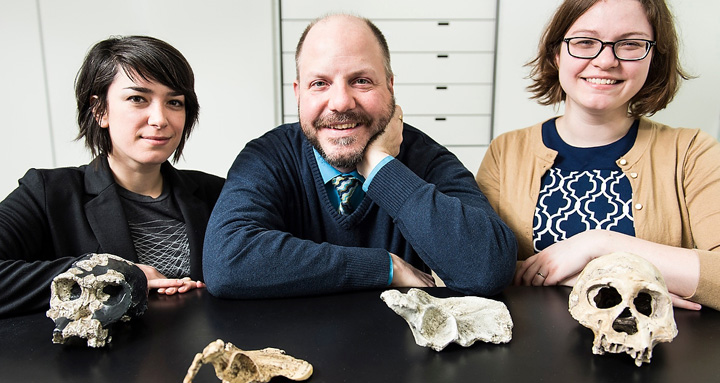
Want to help research at UW–Madison? Spread the word. The professors and grad students who are pushing the boundaries of knowledge need more than funding — they need to share the story of their findings. And that’s where WFAA and Badger alumni can help.
In one of 2015’s most celebrated discoveries, anthropologists found the remains of a new hominid species in a cave in South Africa, and UW–Madison had a role in that find.
Anthropology professor John Hawks was part of the team that brought Homo naledi to light, though it was several of his graduate students who did the dirty work (literally) of bringing the bones up from their underground repository and cleaning and cataloguing them.
Homo naledi to light, though it was several of his graduate students who did the dirty work (literally) of bringing the bones up from their underground repository and cleaning and cataloguing them.
When the news of the discovery broke — first in eLIFE Sciences in September 2015, and then in National Geographic — WFAA helped to spread the news. On Wisconsin magazine (onwisconsin.uwalumni.com) ran a cover story on the findings in its Winter 2015 issue, and WFAA featured Hawks as a presenter at a San Francisco event in support of the All Ways Forward campaign in March 2016.
But importantly, WFAA also took along graduate student Sarah Traynor and postdoc Caroline VanSickle, who had studied under Hawks and taken part in the research. Traynor had traveled deep into the cave to retrieve bone fragments, and VanSickle had helped to assemble them into coherent skeletons.
The three were part of an interactive presentation called “Digging for Collaboration,” discussing not only the discovery but also the multiple universities involved in the African dig and the way that the findings were published openly online.
The discovery is changing our view of our species, but it’s also helping to make the careers of young scientists.
“This project not only introduces a newly discovered species of our own genus — one that will recalibrate the field’s ideas about human origins — it also changes how human-origins research happens by involving early-career scientists with an emphasis on making the fossils widely accessible to everyone,” VanSickle told University Communications. “That will only improve the science.”
